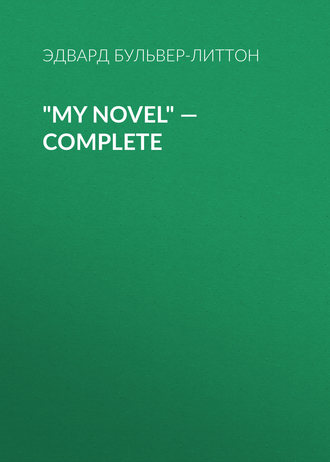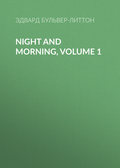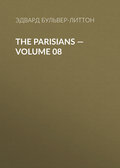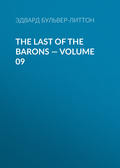
Эдвард Бульвер-Литтон
"My Novel" — Complete
CHAPTER XXI
Whatever ridicule may be thrown upon Mr. Dale’s dissertations by the wit of the enlightened, they had a considerable, and I think a beneficial, effect upon Leonard Fairfield,—an effect which may perhaps create less surprise, when the reader remembers that Leonard was unaccustomed to argument, and still retained many of the prejudices natural to his rustic breeding. Nay, he actually thought it possible that, as both Riccabocca and Mr. Dale were more than double his age, and had had opportunities not only of reading twice as many books, but of gathering up experience in wider ranges of life,—he actually, I say, thought it possible that they might be better acquainted with the properties and distinctions of knowledge than himself. At all events, the parson’s words were so far well-timed, that they produced in Leonard very much of that state of mind which Mr. Dale desired to effect, before communicating to him the startling intelligence that he was to visit relations whom he had never seen, of whom he had heard but little, and that it was at least possible that the result of that visit might be to open to him greater facilities for instruction, and a higher degree in life.
Without some such preparation, I fear that Leonard would have gone forth into the world with an exaggerated notion of his own acquirements, and with a notion yet more exaggerated as to the kind of power that such knowledge as he possessed would obtain for itself. As it was, when Mr. Dale broke to him the news of the experimental journey before him, cautioning him against being over sanguine, Leonard received the intelligence with a serious meekness, and thoughts that were nobly solemn.
When the door closed on his visitors, he remained for some moments motionless, and in deep meditation; then he unclosed the door and stole forth. The night was already far advanced, the heavens were luminous with all the host of stars. “I think,” said the student, referring, in later life, to that crisis in his destiny,—“I think it was then, as I stood alone, yet surrounded by worlds so numberless, that I first felt the distinction between mind and soul.”
“Tell me,” said Riccabocca, as he parted company with Mr. Dale, “whether you would have given to Frank Hazeldean, on entering life, the same lecture on the limits and ends of knowledge which you have bestowed on Leonard Fairfield?”
“My friend,” quoth the parson, with a touch of human conceit, “I have ridden on horseback, and I know that some horses should be guided by the bridle, and some should be urged by the spur.”
“Cospetto!” said Riccabocca, “you contrive to put every experience of yours to some use,—even your journey on Mr. Hazeldean’s pad. And I now see why, in this little world of a village, you have picked up so general an acquaintance with life.”
“Did you ever read White’s’ Natural History of Selborne’?”
“No.”
“Do so, and you will find that you need not go far to learn the habits of birds, and know the difference between a swallow and a swift. Learn the difference in a village, and you know the difference wherever swallows and swifts skim the air.”
“Swallows and swifts!—true; but men—”
“Are with us all the year round,—which is more than we can say of swallows and swifts.”
“Mr. Dale,” said Riccabocca, taking off his hat with great formality, “if ever again I find myself in a dilemma, I will come to you instead of to Machiavelli.”
“Ah!” cried the parson, “if I could but have a calm hour’s talk with you on the errors of the Papal relig—”
Riccabocca was off like a shot.
CHAPTER XXII
The next day Mr. Dale had a long conversation with Mrs. Fairfield. At first he found some difficulty in getting over her pride, and inducing her to accept overtures from parents who had so long slighted both Leonard and herself. And it would have been in vain to have put before the good woman the worldly advantages which such overtures implied. But when Mr. Dale said, almost sternly, “Your parents are old, your father infirm; their least wish should be as binding to you as their command,” the widow bowed her head, and said,—
“God bless them, sir, I was very sinful ‘Honour your father and mother.’ I’m no schollard, but I know the Commandments. Let Lenny go. But he’ll soon forget me, and mayhap he’ll learn to be ashamed of me.”
“There I will trust him,” said the parson; and he contrived easily to reassure and soothe her.
It was not till all this was settled that Mr. Dale drew forth an unsealed letter, which Mr. Richard Avenel, taking his hint, had given to him, as from Leonard’s grandparents, and said, “This is for you, and it contains an inclosure of some value.”
“Will you read it, sir? As I said before, I’m no schollard.”
“But Leonard is, and he will read it to you.”
When Leonard returned home that evening, Mrs. Fairfield showed him the letter. It ran thus:—
DEAR JANE,—Mr. Dale will tell you that we wish Leonard to come to us. We are glad to hear you are well. We forward, by Mr. Dale, a bank-note for L50, which comes from Richard, your brother. So no more at present from your affectionate parents,
JOHN AND MARGARET AVENEL.
The letter was in a stiff female scrawl, and Leonard observed that two or three mistakes in spelling had been corrected, either in another pen or in a different hand.
“Dear brother Dick, how good in him!” cried the widow. “When I saw there was money, I thought it must be him. How I should like to see Dick again! But I s’pose he’s still in Amerikay. Well, well, this will buy clothes for you.”
“No; you must keep it all, Mother, and put it in the Savings Bank.”
“I ‘m not quite so silly as that,” cried Mrs. Fairfield, with contempt; and she put the L50 into a cracked teapot.
“It must not stay there when I ‘m gone. You may be robbed, Mother.”
“Dear me, dear me, that’s true. What shall I do with it? What do I want with it, too? Dear me! I wish they hadn’t sent it. I sha’ n’t sleep in peace. You must e’en put it in your own pouch, and button it up tight, boy.”
Lenny smiled, and took the note; but he took it to Mr. Dale, and begged him to put it into the Savings Bank for his mother.
The day following he went to take leave of his master, of Jackeymo, of the fountain, the garden. But after he had gone through the first of these adieus with Jackeymo—who, poor man, indulged in all the lively gesticulations of grief which make half the eloquence of his countrymen, and then, absolutely blubbering, hurried away—Leonard himself was so affected that he could not proceed at once to the house, but stood beside the fountain, trying hard to keep back his tears.
“You, Leonard—and you are going!” said a soft voice; and the tears fell faster than ever, for he recognized the voice of Violante.
“Do not cry,” continued the child, with a kind of tender gravity. “You are going, but Papa says it would be selfish in us to grieve, for it is for your good; and we should be glad. But I am selfish, Leonard, and I do grieve. I shall miss you sadly.”
“You, young lady,—you miss me?”
“Yes; but I do not cry, Leonard, for I envy you, and I wish I were a boy: I wish I could do as you.”
The girl clasped her hands, and reared her slight form, with a kind of passionate dignity.
“Do as me, and part from all those you love!”
“But to serve those you love. One day you will come back to your mother’s cottage, and say, ‘I have conquered fortune.’ Oh that I could go forth and return, as you will! But my father has no country, and his only child is a useless girl.”
As Violante spoke, Leonard had dried his tears: her emotion distracted him from his own.
“Oh,” continued Violante, again raising her head loftily, “what it is to be a man! A woman sighs, ‘I wish,’ but a man should say, ‘I will.’”
Occasionally before Leonard had noted fitful flashes of a nature grand and heroic in the Italian child, especially of late,—flashes the more remarkable from the contrast to a form most exquisitely feminine, and to a sweetness of temper which made even her pride gentle. But now it seemed as if the child spoke with the command of a queen,—almost with the inspiration of a Muse. A strange and new sense of courage entered within him.
“May I remember these words!” he murmured, half audibly.
The girl turned and surveyed him with eyes brighter for their moisture. She then extended her hand to him, with a quick movement, and as he bent over it, with a grace taught to him by genuine emotion, she said, “And if you do, then, girl and child as I am, I shall think I have aided a brave heart in the great strife for honour!”
She lingered a moment, smiled as if to herself, and then, gliding away, was lost amongst the trees.
After a long pause, in which Leonard recovered slowly from the surprise and agitation into which Violante had thrown his spirits—previously excited as they were—he went, murmuring to himself, towards the house. But Riccabocca was from home. Leonard turned mechanically to the terrace, and busied himself with the flowers; but the dark eyes of Violante shone on his thoughts, and her voice rang in his ear.
At length Riccabocca appeared on the road, attended by a labourer, who carried something indistinct under his arm. The Italian beckoned to Leonard to follow him into the parlour, and after conversing with him kindly, and at some length, and packing up, as it were, a considerable provision of wisdom in the portable shape of aphorisms and proverbs, the sage left him alone for a few moments. Riccabocca then returned with his wife, and bearing a small knapsack:—
“It is not much we can do for you, Leonard, and money is the worst gift in the world for a keepsake; but my wife and I have put our heads together to furnish you with a little outfit. Giacomo, who was in our secret, assures us that the clothes will fit; and stole, I fancy, a coat of yours, to have the right measure. Put them on when you go to your relations: it is astonishing what a difference it makes in the ideas people form of us, according as our coats are cut one way or another. I should not be presentable in London thus; and nothing is more true than that a tailor is often the making of a man.”
“The shirts, too, are very good holland,” said Mrs. Riccabocca, about to open the knapsack.
“Never mind details, my dear,” cried the wise man; “shirts are comprehended in the general principle of clothes. And, Leonard, as a remembrance somewhat more personal, accept this, which I have worn many a year when time was a thing of importance to me, and nobler fates than mine hung on a moment. We missed the moment, or abused it; and here I am a waif on a foreign shore. Methinks I have done with Time.”
The exile, as he thus spoke, placed in Leonard’s reluctant hands a watch that would have delighted an antiquary, and shocked a dandy. It was exceedingly thick, having an outer case of enamel and an inner one of gold. The hands and the figures of the hours had originally been formed of brilliants; but the brilliants had long since vanished. Still, even thus bereft, the watch was much more in character with the giver than the receiver, and was as little suited to Leonard as would have been the red silk umbrella.
“It is old-fashioned,” said Mrs. Riccabocca; “but it goes better than any clock in the county. I really think it will last to the end of the world.”
“Carissima mia!” cried the doctor, “I thought I had convinced you that the world is by no means come to its last legs.”
“Oh, I did not mean anything, Alphonso,” said Mrs. Riccabocca, colouring.
“And that is all we do mean when we talk about that of which we can know nothing,” said the doctor, less gallantly than usual, for he resented that epithet of “old-fashioned,” as applied to the watch.
Leonard, we see, had been silent all this time; he could not speak,—literally and truly, he could not speak. How he got out of his embarrassment and how he got out of the room, he never explained to my satisfaction. But a few minutes afterwards, he was seen hurrying down the road very briskly.
Riccabocca and his wife stood at the window gazing after him.
“There is a depth in that boy’s heart,” said the sage, “which might float an argosy.”
“Poor dear boy! I think we have put everything into the knapsack that he can possibly want,” said good Mrs. Riccabocca, musingly.
THE DOCTOR (continuing his soliloquy).—“They are strong, but they are not immediately apparent.”
MRS. RICCABOCCA (resuming hers).—“They are at the bottom of the knapsack.”
THE DOCTOR.—“They will stand long wear and tear.”
MRS. RICCABOCCA.—“A year, at least, with proper care at the wash.”
THE DOCTOR (startled).—“Care at the wash! What on earth are you talking of, ma’am?”
MRS. RICCABOCCA (mildly).—“The shirts, to be sure, my love! And you?”
THE DOCTOR (with a heavy sigh).—“The feelings, ma’am!” Then, after a pause, taking his wife’s hand affectionately, “But you did quite right to think of the shirts: Mr. Dale said very truly—”
MRS. RICCABOCCA.—“What?”
THE DOCTOR.—“That there was a great deal in common between us—even when I think of feelings, and you but of—shirts!”
CHAPTER XXIII
Mr. and Mrs. Avenel sat within the parlour, Mr. Richard stood on the hearthrug, whistling “Yankee Doodle.” “The parson writes word that the lad will come to-day,” said Richard, suddenly; “let me see the letter,—ay, to-day. If he took the coach as far as ———-, he might walk the rest of the way in two or three hours. He should be pretty nearly here. I have a great mind to go and meet him: it will save his asking questions, and hearing about me. I can clear the town by the back way, and get out at the high road.”
“You’ll not know him from any one else,” said Mrs. Avenel.
“Well, that is a good one! Not know an Avenel! We’ve all the same cut of the jib,—have we not, Father?”
Poor John laughed heartily, till the tears rolled down his cheeks.
“We were always a well-favoured fam’ly,” said John, recomposing himself. “There was Luke, but he’s gone; and Harry, but he’s dead too; and Dick, but he’s in Amerikay—no, he’s here; and my darling Nora, but—”
“Hush!” interrupted Mrs. Avenel; “hush, John!”
The old man stared at her, and then put his tremulous hand to his brow. “And Nora’s gone too!” said he, in a voice of profound woe. Both hands then fell on his knees, and his head drooped on his breast.
Mrs. Avenel rose, kissed her husband on the forehead, and walked away to the window. Richard took up his hat and brushed the nap carefully with his handkerchief; but his lips quivered.
“I ‘m going,” said he, abruptly. “Now mind, Mother, not a word about uncle Richard yet; we must first see how we like each other, and—[in a whisper] you’ll try and get that into my poor father’s head?”
“Ay, Richard,” said Mrs. Avenel, quietly. Richard put on his hat and went out by the back way. He stole along the fields that skirted the town, and had only once to cross the street before he got into the high road.
He walked on till he came to the first milestone. There he seated himself, lighted his cigar, and awaited his nephew. It was now nearly the hour of sunset, and the road before him lay westward. Richard, from time to time, looked along the road, shading his eyes with his hand; and at length, just as the disk of the sun had half sunk down the horizon, a solitary figure came up the way. It emerged suddenly from the turn in the road; the reddening beams coloured all the atmosphere around it. Solitary and silent it came as from a Land of Light.
CHAPTER XXIV
“You have been walking far, young man?” said Richard Avenel.
“No, sir, not very. That is Lansmere before me, is it not?”
“Yes, it is Lansmere; you stop there, I guess?”
Leonard made a sign in the affirmative, and walked on a few paces; then, seeing the stranger who had accosted him still by his side, he said,—
“If you know the town, sir, perhaps you will have the goodness to tell me whereabouts Mr. Avenel lives?”
“I can put you into a straight cut across the fields, that will bring you just behind the house.”
“You are very kind, but it will take you out of your way.”
“No, it is in my way. So you are going to Mr. Avenel’s?—a good old gentleman.”
“I’ve always heard so; and Mrs. Avenel—”
“A particular superior woman,” said Richard. “Any one else to ask after?—I know the family well.”
“No, thank you, sir.”
“They have a son, I believe; but he’s in America, is he not?”
“I believe he is, sir.”
“I see the parson has kept faith with me muttered Richard.”
“If you can tell me anything about HIM,” said Leonard, “I should be very glad.”
“Why so, young man? Perhaps he is hanged by this time.”
“Hanged!”
“He was a sad dog, I am told.”
“Then you have been told very falsely,” said Leonard, colouring.
“A sad wild dog; his parents were so glad when he cut and run,—went off to the States. They say he made money; but, if so, he neglected his relations shamefully.”
“Sir,” said Leonard, “you are wholly misinformed. He has been most generous to a relation who had little claim on him: and I never heard his name mentioned but with love and praise.”
Richard instantly fell to whistling “Yankee Doodle,” and walked on several paces without saying a word. He then made a slight apology for his impertinence, hoped no offence, and, with his usual bold but astute style of talk, contrived to bring out something of his companion’s mind. He was evidently struck with the clearness and propriety with which Leonard expressed himself, raised his eyebrows in surprise more than once, and looked him full in the face with an attentive and pleased survey. Leonard had put on the new clothes with which Riccabocca and his wife had provided him. They were those appropriate to a young country tradesman in good circumstances; but as Leonard did not think about the clothes, so he had unconsciously something of the ease of the gentleman.
They now came into the fields. Leonard paused before a slip of ground sown with rye.
“I should have thought grass-land would have answered better so near a town,” said he.
“No doubt it would,” answered Richard; “but they are sadly behind-hand in these parts. You see the great park yonder, on the other side of the road? That would answer better for rye than grass; but then, what would become of my Lord’s deer? The aristocracy eat us up, young man.”
“But the aristocracy did not sow this piece with rye, I suppose?” said Leonard, smiling.
“And what do you conclude from that?”
“Let every man look to his own ground,” said Leonard, with a cleverness of repartee caught from Dr. Riccabocca.
“‘Cute lad you are,” said Richard; “and we’ll talk more of these matters another time.”
They now came within sight of Mr. Avenel’s house.
“You can get through the gap in the hedge, by the old pollard-oak,” said Richard; “and come round by the front of the house. Why, you’re not afraid, are you?”
“I am a stranger.”
“Shall I introduce you? I told you that I knew the old couple.”
“Oh, no, sir! I would rather meet them alone.”
“Go; and—wait a bit-hark ye, young man, Mrs. Avenel is a cold-mannered woman; but don’t be abashed by that.” Leonard thanked the good-natured stranger, crossed the field, passed the gap, and paused a moment under the stinted shade of the old hollow-hearted oak. The ravens were returning to their nests. At the sight of a human form under the tree they wheeled round and watched him afar. From the thick of the boughs, the young ravens sent their hoarse low cry.







